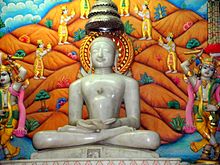Ajitnath
| Ajitanatha | |
|---|---|
| 2nd Jain Tirthankara | |

Lord Ajitanatha (Mathura Chaurasi)
|
|
| Venerated in | Jainism |
| Predecessor | Rishabhanatha |
| Successor | Sambhavanatha |
| Symbol | Elephant |
| Height | 450 bows (1,350 meters) |
| Age | 72 lakh purva (508.032 x 1018 years old) |
| Color | Golden |
| Personal Information | |
| Born | Ayodhya |
| Moksha | Shikharji |
| Parents |
|
Ajitnatha (lit. invincible) was the second tirthankara of the present age, avasarpini (half time cycle) according to Jainism. He was born to King Jitashatru and Queen Vijaya at Ayodhya in the Ikshvaku dynasty. According to Jain beliefs, he became a siddha, a liberated soul which has destroyed all of its karma.
Ajitnatha (lit. invincible) was the second tirthankara of the present age, avasarpini (half time cycle) according to Jainism.
Ajitnatha was born in the town of Saketa to King Jitashatru and Queen Vijaya at Ayodhya in the Ikshvaku dynasty on magha-shukla-dashmi (the tenth day of the bright half of the month of Magha). His height was 450 dhanusha (1350 meters) and he lived for a span of 72 lakh purva.
He attained kevala jnana under the sal tree and Moksha on chaitra-shukla-panchmi (fifth day of the bright half of the month of Chaitra) from Shikharji.
Simhasena was his chief Ganadhara.
The Yajurveda mentions the name of Ajitanatha, but the meaning is not clear. According to Jain traditions, his younger brother was Sagara. Sagara, who became the second Chakravartin, is known from the traditions of both Hindu and Jain scriptures.
Ajinatha is associated with his Elephant emblem, Saptha-parna tree, Mahayaksha Yaksha and Yogini & Ajithabala Yakshis.
...
Wikipedia
